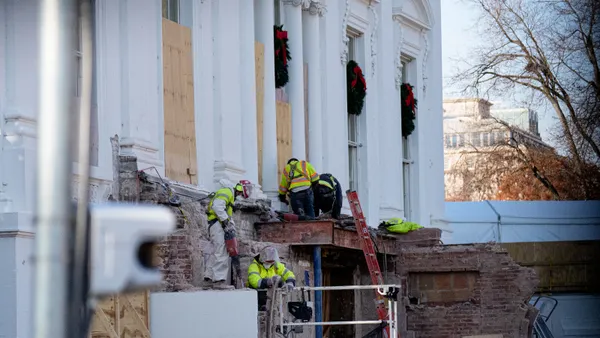Dive Brief:
- The Associated Builders and Contractors released its "Merit Shop Scorecard" Wednesday, which reviews and grades programs and information intrinsic to a successful construction industry on a state-by-state basis.
- The scorecard, developed in coordination with ABC chapters and major industry players nationwide, grades states on their policies and records on key issues: project labor agreements (PLAs), prevailing wage, right to work, public-private partnerships (P3s), workforce development, career and technical education, and job growth rate.
- Arizona, Louisiana, Virginia, North Dakota and North Carolina received the highest overall scorecard grades. In contrast, New Mexico, Alaska, New York, New Jersey, Illinois and Rhode Island received the lowest grades.
Dive Insight:
According to the ABC, the general merit shop philosophy is based on free enterprise and free market principles, characterized by open and fair competition and diverse, engaged parties. The philosophy supports the concept that employees and employers have the right to determine wages and working conditions as they choose, within the law, and that all branches of government should be responsible stewards of taxpayer dollars, awarding contracts based solely on merit to the lowest responsible bidder, regardless of labor affiliation.
"The Merit Shop Scorecard will be a useful tool for lawmakers and industry stakeholders to explain how state policies affect the ability of contractors to conduct business and expand their operations," ABC Director of Labor and Federal Procurement Ben Brubeck said. "The scorecard highlights high-performing states that have enacted policies opposing anti-competitive schemes and restrictive, cost-inflating mandates while embracing fairness in the workplace. It also identifies low-performing states that have failed to foster environments where businesses can thrive, invest and create construction jobs in local communities."
The ABC has supported court decisions against government-mandated PLAs. A high score in this category indicates the state is in favor of government neutrality in PLA use, meaning the state does not support government-mandated PLAs.
In regards to P3s, even though they are gaining in popularity in the U.S., they’re not as widely utilized as they are in countries like Canada. However, according to the scorecard, more than half of all states have enacted laws allowing P3s, which is the basis of the score. Texas has seen some high-profile success with P3s, and Brendan Bechtel of the Bechtel Group recently wrote an op-ed piece in USA Today in which he urged federal and state agencies to adopt P3s as a way of tackling the country’s aging infrastructure.












